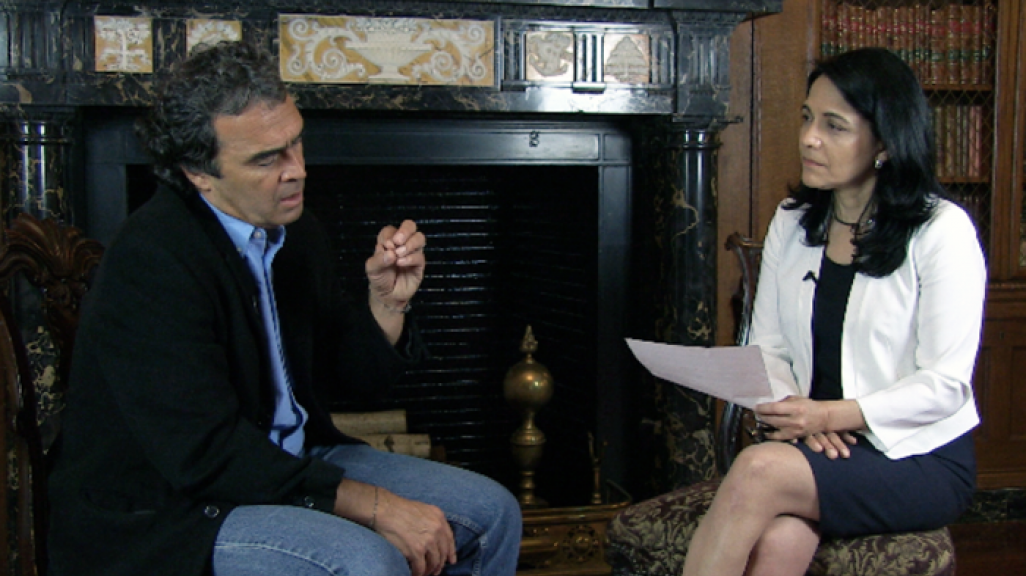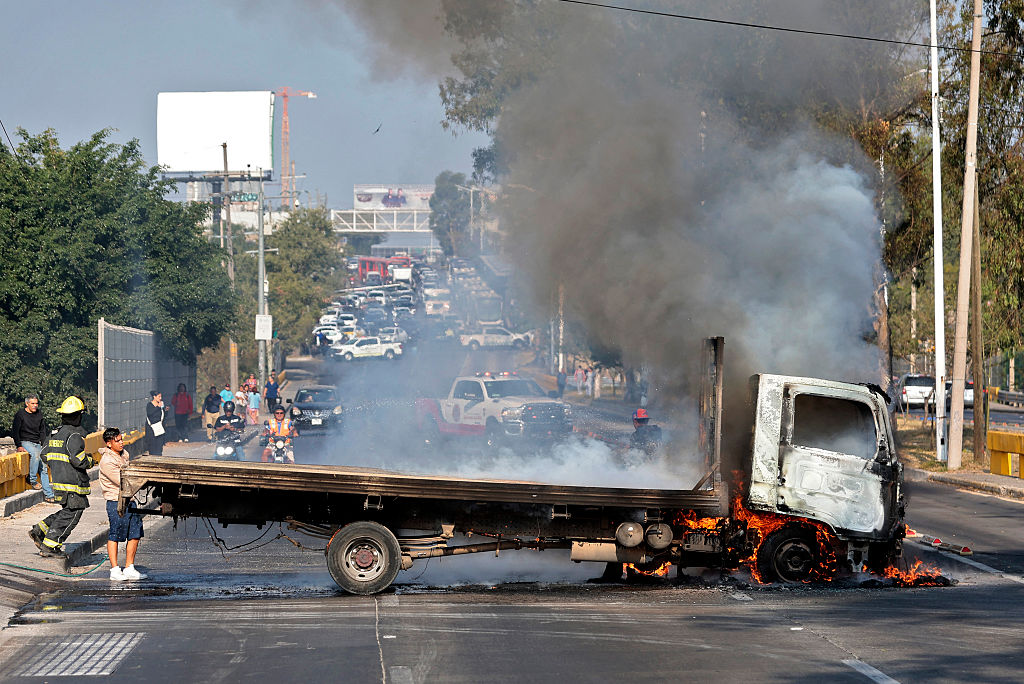Interview: Governor Sergio Fajardo on Building Peace in Colombia
Interview: Governor Sergio Fajardo on Building Peace in Colombia
As FARC peace talks hit their three-year mark, the Antioquia governor reveals how to transform Colombian society to secure peace.
“Just making sure that we are still alive every day—that doesn’t make sense. We have to be able to build our path in life.”
With a guerilla attack complicating Colombia’s peace process, many wonder whether President Juan Manuel Santos’ aim to seal a deal by the end of the year is a feasible goal. The recent death of 11 soldiers after an attack by the Revolutionary Armed Forces of Colombia (FARC) on April 15 suggests security remains an issue. Meanwhile a March Cifras y Conceptos poll shows that Colombians are three times more likely to be concerned about street crimes than the guerrillas.
AS/COA’s Director of Media Relations Adriana La Rotta spoke to Antioquia Governor Sergio Fajardo on the peace talks, what a post-conflict scenario looks like, and the role of education in securing lasting peace.
Adriana La Rotta: The peace process between the Colombian government and the FARC guerilla group began almost three years ago. Are you in favor of establishing deadlines for the conclusions of the conversations?
Sergio Fajardo: Let me begin by saying I’m in favor of the peace process; it’s a crucial need for Colombia. We have lived under the umbrella of violence for so many decades and we have to give ourselves the opportunity to live in a decent society.
|
We have lived under the umbrella of violence for so many decades and we have to give ourselves the opportunity to live in a decent society. |
Secondly, the process has many challenges, some very painful ones like the one that we had last week, which was an extraordinary setback because it destroyed the trust that we had been building step by step.
Now, one of the problems that the process has is that it has no endpoint—at least that we can say. And when you have been going through this for almost three years now, then people start losing confidence. Then we are in trouble. So I agree that there should be a timetable with some points where we can review things and eventually finish the negotiation.
La Rotta: How is Antioquia, your province in particular, preparing for post-conflict?
Fajardo: From the very first day that President Santos announced that Colombia was beginning this peace process, we immediately created a program called Preparemonos para la paz (preparing for peace). Our claim is that the construction of peace has to be done in the territory where we have seen violence. In Antioquia, we have seen all sort of violence, we know exactly what the conditions are of the communities, we know our weaknesses, we know the needs that we have, and we have been thinking about how we can build a new institutional framework. The building of peace can be the best excuse to have a better presence of the state throughout the territory so that everyone in Colombia, in Antioquia in particular, perceives the state as part of their lives, they can claim their rights, and have an opportunity in life.
Let me point out that for most Colombians, the guerillas are a phenomenon that is far away. The guerillas are not in the main cities where most people live. We hear about the guerillas because they do something—particular attacks or they destroy something—but far away. So what we have to think in Colombia, in my personal view, is that the peace process is not only to stop that, but also how we can live better in Colombia. That means how we handle discussions, how we interact among ourselves without being enemies, without using force in some way in order to put forward our arguments, our ideas, our needs, etc. So the peace process, for me, is an opportunity to move in the sense of being a better society.
La Rotta: There are mixed reviews when it comes to security. People suggest that things are better; others say that things are deteriorating. What’s your take on the current security situation in your province and in Colombia in general?
Fajardo: I have no doubt that we have gotten better regarding security issues in the macro sense. Now, the problems continue to evolve. The guerrillas have been diminished to a point where they are negotiating. That wasn’t because the guerrillas decided to be nice from now on; it was a particular condition. Now, we have problems that we have to anticipate, which are associated with the criminal bands, the evolution of narcotrafficking. At the beginning there was a cartel, then another cartel with another view, then the paramilitary. Now they are called the criminal gangs—bandas criminales—and they want to get into Colombia because Colombia is a huge market. We are soon to be 50 million people. In cities, they come with extortion, micro trafficking, and this is associated with criminal organizations. I was saying that the original fighting doesn’t affect people in Bogota today. They have had some terrorists attacks—it has been a while since they had one—but extortion has to do with citizen life, seguridad ciudadana.
So we have to aware of the new conditions. Those conditions are changing throughout Latin America. That doesn’t make us better, but we have to locate our efforts, many of them associated with citizen security within cities.
La Rotta: One of your main initiatives as governor is Parques educativos. Can you briefly explain what they are?
Fajardo: Let me begin with this. Just making sure that we are still alive every day—that doesn’t make sense. We have to be able to build our path in life, every one of us, freely. When you are scared, you are stripped away of your dignity. So we have to get our people, once again in life, to dream about something, to have hope. Otherwise, if you don’t dream, if you don’t have hope, you don’t transform yourself. So we have to bring to our lives a place where we can see that things can happen. Instead of spending all of our time talking about the army, fighting, corrupt people, illegals, we see that the dignity of human people can shine.
|
In every town where we have a parque educativo, we have a social transformation, a community that is in power. |
So we build those spaces, which are beautiful. We claim they have to be beautiful because many times there is this underlying idea that if it’s for humble people, whatever you give them, that’s a lot because they have nothing. So I said no, the most beautiful thing here, and the most beautiful space in this town should be associated with education, science, technology, innovation, entrepreneurship; a place where teachers—the maestros y maestras—are the most important people in the town; not the guerrilla guy, the paramilitary guy, the corrupt guy, but the teachers.
We are building 80 beautiful parques educativos [educational parks] throughout Antioquia. We don’t give away parques educativos; every community that has a parque educativo is because they wanted to. We have the board of the park—people from different sectors of a tiny town—taking part in discussing how they can improve things and what programs they can have. So we have these architects listening to them designing their dreams, building their dreams, and then in every town where we have a parque educativo, we have a social transformation, a community that is in power.
We are putting together these 80 parks throughout Antioquia as we integrate our state. Antioquia is a very complex territory: el Magdalena, el Cauca, el Atrato, el Caribe, mountains. It’s very difficult to communicate from one place to another using technology. We expect to have the University of Antioquia bringing programs to all these places.
La Rotta: You are universally known for the transformation of Medellin when you were mayor there, and you are trying to replicate that with differences in the province that you lead now. If you were to advise mayors, governors in other parts of Latin America or the world, what would be the main lessons from Medellin?
Fajardo: The main lesson is changing politics in the way we relate to people and build trust. Some people think, “I am doing what the community decides.” That’s not what we are here for. We have to take into account communities. But as leaders, we have to understand the feelings of people, their dreams, what they make sense out of their existence. If we interpret that, we can build a vision, we can build a path.
The problems in Medellín are different from the problems in Bogotá. We may do some things that are the same, but the way you get in there is very different. Many times in politics the guiding principle has been “the end justifies the means.” We believe it’s the means that justify the end; how you get there is crucial for the transformation that you want to have.








